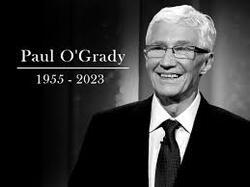 If you want to know what Paul O'Grady achieved for representation of drag and representation of gay people on TV as a whole, you just need to look at what was there before Lily Savage came along. Before Lily, there was John Inman, Larry Grayson, Liberace and Danny La Rue. They were homosexuals playing heterosexual caricatures of gay people, in much the same way that comedians such as Frank Carson and Charlie Williams were Irish and Black comedians playing a caricatured version of Irish and Black people to appeal to a British and White audience. Lily Savage changed the rules about what drag artists and gay performers could be on television. She was not a camp apologist, putting on airs and graces while coming out with 'saucy' remarks and double entendres, she was a crude working class woman with a barbed tongue and a foul mouth who said it like it was and took no prisoners in her put downs. She reclaimed drag and queer culture from straight people, and in doing so she also brought it into the mainstream on her own terms. Born on the streets of Liverpool, she was to Merseyside what the likes of Ena Sharples and Elsie Tanner were to Salford, a homage to the working class women of the cities their creators grew up in. But Lily wasn't just written by a man, she was played a man. That, without compromising or changing the character in any way, she could go on to host chat shows and take on a TV quiz show that was forever associated with Sir Terry Wogan was a testament to Paul O'Grady's talent and integrity. While Lily undoubtedly helped to pave the way for all that followed, there is something very different between her and the modern day equivalent as seen on Drag Race UK. While Baga Chipz and others may be closer to Savage than they are to the American influences that dominate the UK show, you still could not imagine O'Grady compromising his creation by putting her into a competition with other drag queens and playing silly games for a late night TV audience. It is not something that the character of Lily would have done, so it is not something that O'Grady would have made her do. Lily was a person in her own right. Or was she? Lily was not a 'real person'. Although O'Grady drew on his mother, his relatives and other females he knew, she was his creation, a composite of all those people and more. That O'Grady tired of playing her was his right, but moving on from a creation that defines you always comes with the risk of a long journey into anonymity as the public forever associate you with the thing that made you famous. If you don't believe me, just look at the example of JK Rowling, who, even when she is being called out for transphobia, and in spite of her crime writing alter ego, is still referred to as the Harry Potter author. Or look at Kelsey Grammar who is back playing Frasier because, almost 20 years after he quit the role, no one can remember anything he's done when he wasn't playing Frasier. O'Grady resisted the pressure to keep Lily alive (even if he did retire her to a convent in Brittany rather than kill her off) and he also refused to settle for the easy option of continuing to play a character he no longer wanted to be. His decision paid off. His post Lily career saw him earn the dubious honour of National Treasure, alongside Graham Norton and Dale Winton. While this may still say something about the way mainstream audiences like their gay icons to be cuddly and safe, all three of them were (and in Norton's case still is) far better role models for queer representation that Inman, Grayson or De La Rue were as they have not been filtered through straight perceptions of what gay characters should be. Paul and Lily were, at least, unconscious inspirations when I was writing Make-up - the idea of the performer getting tired with their creation, wanting to leave her behind but finding that their audience won't let them, has an unconscious echo to Paul's decision to retire Lily - but they were more than that. Without them, it is unlikely that a play such as Make-up would ever be made, let alone draw an audience that includes large numbers of heterosexuals who engage with the Q and As we do after most of the performances. O'Grady was a trailblazer twice over. But more than that, he seemed to be a genuinely nice person. Paul and Lily are now gone, but their memory and influence will live on. Rest in Peace both of you.
0 Comments
Leave a Reply. |
AuthorAndy Moseley, writer and director of Make-up talks about the play, making theatre during lockdown and anything else that springs to mind. Archives
March 2023
Categories |
 RSS Feed
RSS Feed
